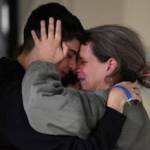Israel and Hamas have successfully managed a hostage deal for four days – Hamas released 50 Israelis in four batches, and Israel released 150 Palestinian prisoners from Israeli jails. Israel paused its military operation in Gaza, and Hamas agreed that it would allow the Red Cross to meet the remaining hostages in Gaza. Hundreds of Israeli families have been asking for life signs of their loved ones who have been left out of this deal and, hence, will be in Gaza for a long time.
The short deal went well, barring one evening, Saturday, 25 November, when Hamas delayed the release of the Israeli hostages for more than ten hours. The agreement was extended for two additional days, for which Hamas will release 10 Israelis each day. That will make the ceasefire for six full days until 29 November.
In Israel, the days have been mixed with relief and anxiety. News channels had live broadcasts of the movement of the Israeli hostages out of Gaza into Egypt and from there to different hospitals in Israel. After a month and a half, it was relief and joy for those who received their relatives back, but it has been anxiety-ridden for those whose family members did not make it to the list of 50 people.
What next for Hamas and for Israel? Hamas faces an existential crisis in Gaza now that the Israeli army, since Oct 27, has captured its military headquarters and operating tunnels in northern Gaza through massive ground operation. So far Israel has been successful in ignoring international pressure to limit its ground operation or commit to an explicit timeline. The Israeli military raid on Shifa Hospital was a decisive signal to Hamas that it won’t be able to save any of its hideouts.
Hamas avoided a hostage deal as long as it could, thinking Israel would not be able to act freely either because of the regional threats from Hezbollah and Iran or under the political pressure from Arab states and street protests especially in the West. The growing humanitarian crisis in Gaza was calculated as an important factor that would help Hamas escape the overwhelming Israeli army operation. The Israeli retaliation has caused the deaths of more than 12,000 people and turned more than 1 million homeless in Gaza, for which the international community has called out Israel. The humanitarian crisis has also become a liability for Hamas as it has a choice to go for a hostage deal with Israel and seek further ceasefire.
The Arab world is examining the situation closely. Khaled Mashal, the former head of Hamas, found himself in a difficult interview[1] with Al-Arabiya host Rasha Nabil of Saudi Arabia, who asked Mashal if Hamas took the wellbeing of the people of Gaza into account, and he said, without much hesitation, that the liberation demands sacrifice. When questioned about attacking Israeli civilians – women, children and the aged – and not the Israeli army, and whether“ treating civilians like this part of Hamas’ ideology”, Mashal replied that in “wars there are civilian victims, and we are not responsible for them”. .Musa Abu Marzou, head of the Hamas International Office, spoke to Indian interviewer Karan Thapar[2] on 18 November, and tried to deny that Hamas killed children and women on 7 October or that most of the hostages taken by Hamas are civilians.
The Arab Barometer, a nonpartisan organization with the largest database of the views of Arab people, published a survey[3] called ‘What Palestinians Really think of Hamas’ just prior to the attack of 7 Oct. The vast majority of Gazans, close to 70%, said they do not trust Hamas for their everyday wellbeing or their struggle for statehood. The survey showed that most Gazans do not align themselves with Hamas’s religious ideology and jihad. The majority of respondents favoured a two-state solution with an independent Palestine and Israel existing side by side, whereas Hamas’s goal is to destroy Israel.
The current war will not end soon; there are too many Israeli hostages in Gaza still for the Israeli army to stop its military operations. After its one-day success of 7 Oct, Hamas is in a blind spot – holding the hostages will not be easy, as the homeless of Gaza need immediate relief and aid to survive, for which a longer ceasefire is essential. The harsh winter and rains have just begun to make it worse for the Gazans. The sacrifice that Hamas intends Palestinians to make for their ideology, may find itself exposed.
Dr Khinvraj Jangid is an Associate Professor and Director Centre for Israel Studies, Jindal School of International Affairs, OP Jindal Global University, Sonipat. He is visiting faculty at Ben-Gurion University of the Negev, Israel, for 2022-2024.
This blog was exclusively written for Gateway House: Indian Council on Global Relations. You can read more exclusive content here.
Support our work here.
For permission to republish, please contact outreach@gatewayhouse.in
©Copyright 2023 Gateway House: Indian Council on Global Relations. All rights reserved. Any unauthorised copying or reproduction is strictly prohibited.
References
[1] Exclusive, Al-Arabiya English, 19 October 2023. Available online: https://english.alarabiya.net/News/middle-east/2023/10/19/-Israel-is-killing-us-whether-we-resist-or-not-says-former-Hamas-chief
[2] Top Hamas Leader Admits taking babies and elderly hostage ‘a mistake’, reveals hostage deal details, The Wire, 18 November 2023. Available Online: https://www.youtube.com/watch?v=AGL3mkKQ8ng&t=582s
[3] What Palestinians Really Think of Hamas?, Arab Barometer, 25 October 2023. Available Online: https://www.arabbarometer.org/media-news/what-palestinians-really-think-of-hamas/


